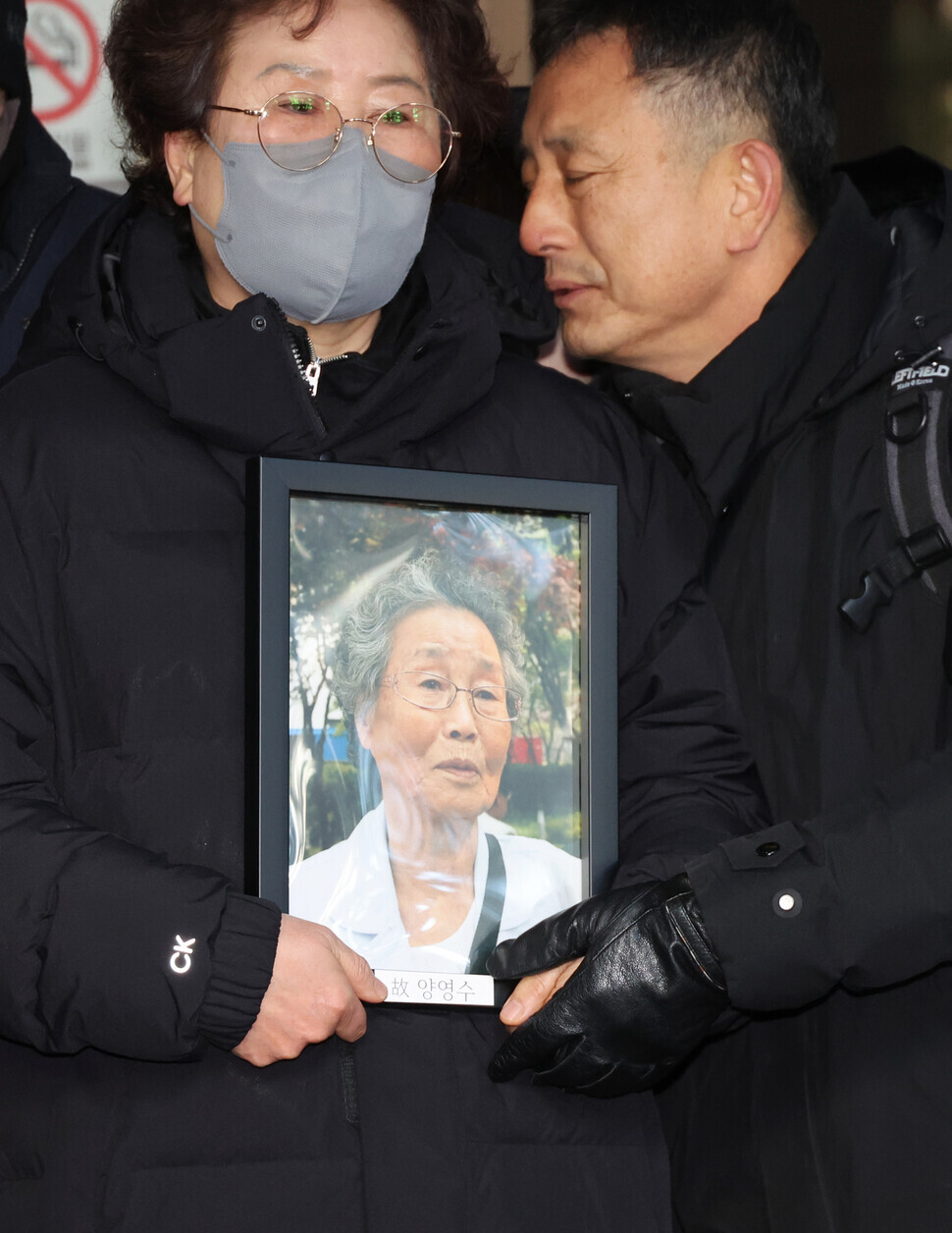hankyoreh
Links to other country sites 다른 나라 사이트 링크
[Editorial] Korea’s Supreme Court once again rules Japanese firms must directly compensate forced labor victims

South Korea’s Supreme Court has issued yet another ruling holding Japanese companies responsible for compensating Koreans conscripted for forced labor during Japan’s colonial occupation of Korea. This ruling followed naturally from the precedent of the Supreme Court’s en banc decision in 2018.
The latest ruling once again confirms that the “third-party compensation” plan that’s being unilaterally promoted by the Yoon administration flies in the face of the judiciary’s position.
Given the growing likelihood that the plaintiffs will prevail in some 60 pending cases about forced labor, the third-party compensation plan appears to be in serious trouble. The problem is that the fund set up to compensate the victims on behalf of the Japanese companies is wholly inadequate to cover that many victims. The fault lies with Korean President Yoon Suk-yeol’s ill-considered push for the third-party compensation plan in disregard of the court’s judgment.
The second petty bench of the Supreme Court (under Justice Lee Dong-won) upheld a lower court’s ruling in a damages claim against Nippon Steel and Mitsubishi Heavy Industries. The lower court had ruled in favor of the surviving relatives of victims of forced labor during Japan’s colonization of Korea.
The latest ruling adheres to the spirit of the Supreme Court’s 2018 en banc ruling that held Japanese companies responsible for compensating forced labor based on the illegality of Japan’s colonial rule over Korea and the compulsory mobilization of the conscripted laborers.
This ruling is expected to have major ramifications for other lawsuits about forced labor, since it treats 2018 (when the Supreme Court reached its landmark en banc ruling) as the time for calculating the statute of limitations for these cases.
All of the other 60 lawsuits were filed after 2018. Mitsubishi Heavy Industries and the other defendants argued that the three-year statute of limitations had already ended, presuming that the clock began with the Supreme Court’s first ruling on compensation for forced labor in 2012, but the Supreme Court didn’t accept that argument. Instead, the Supreme Court said that victims were only capable of filing for damages after an en banc decision (which involves all the justices on the court) was rendered.
The Foundation for Victims of Forced Mobilization by Imperial Japan, which the government set up to provide third-party compensation for the victims, has only received 4 billion won donated by POSCO. Considering that around 110 people have also filed damages lawsuits, the total amount of compensation needed to be paid out is estimated to exceed 15 billion won.
When the government announced its third-party compensation plan, it pledged to set up a private-sector fund with donations from various companies, but so far the only participating company is POSCO, which was a beneficiary of economic cooperation funds provided by Japan after it normalized relations with Korea.
Unless the fund is expanded, the government may find itself in the absurd position of not even being able to carry out its third-party compensation plan. The Yoon administration has already made big concessions to Japan without having anything to show for it, and now it may have to browbeat Korean companies to make more donations to the fund.
When some of the victims rejected third-party compensation, the government attempted to force them to accept a deposit, but that effort was soon checked by the courts. Third-party compensation is already bankrupt on a legal level, and it’s now looking less and less viable on a practical level as well. The Yoon administration needs to stop insisting on the third-party compensation plan.
Please direct questions or comments to [english@hani.co.kr]

Editorial・opinion
![[Editorial] Intensifying US-China rivalry means Seoul must address uncertainty with Beijing sooner than later [Editorial] Intensifying US-China rivalry means Seoul must address uncertainty with Beijing sooner than later](https://flexible.img.hani.co.kr/flexible/normal/500/300/imgdb/original/2024/0517/8117159322045222.jpg) [Editorial] Intensifying US-China rivalry means Seoul must address uncertainty with Beijing sooner than later
[Editorial] Intensifying US-China rivalry means Seoul must address uncertainty with Beijing sooner than later![[Column] When ‘fairness’ means hate and violence [Column] When ‘fairness’ means hate and violence](https://flexible.img.hani.co.kr/flexible/normal/500/300/imgdb/original/2024/0516/7417158465908824.jpg) [Column] When ‘fairness’ means hate and violence
[Column] When ‘fairness’ means hate and violence- [Editorial] Yoon must stop abusing authority to shield himself from investigation
- [Column] US troop withdrawal from Korea could be the Acheson Line all over
- [Column] How to win back readers who’ve turned to YouTube for news
- [Column] Welcome to the president’s pity party
- [Editorial] Korea must respond firmly to Japan’s attempt to usurp Line
- [Editorial] Transfers of prosecutors investigating Korea’s first lady send chilling message
- [Column] Will Seoul’s ties with Moscow really recover on their own?
- [Column] Samsung’s ‘lost decade’ and Lee Jae-yong’s mismatched chopsticks
Most viewed articles
- 1[Editorial] Transfers of prosecutors investigating Korea’s first lady send chilling message
- 2[Exclusive] Unearthed memo suggests Gwangju Uprising missing may have been cremated
- 3[Column] US troop withdrawal from Korea could be the Acheson Line all over
- 4[Editorial] Intensifying US-China rivalry means Seoul must address uncertainty with Beijing sooner t
- 5‘Shot, stabbed, piled on a truck’: Mystery of missing dead at Gwangju Prison
- 6China, Russia put foot down on US moves in Asia, ratchet up solidarity with N. Korea
- 7Xi, Putin ‘oppose acts of military intimidation’ against N. Korea by US in joint statement
- 8Constitutional Court declares act that denies unions by university professors is unconstitutional
- 9[Reporter’s notebook] What’s the secret behind BTS’ success?
- 10[Column] Welcome to the president’s pity party